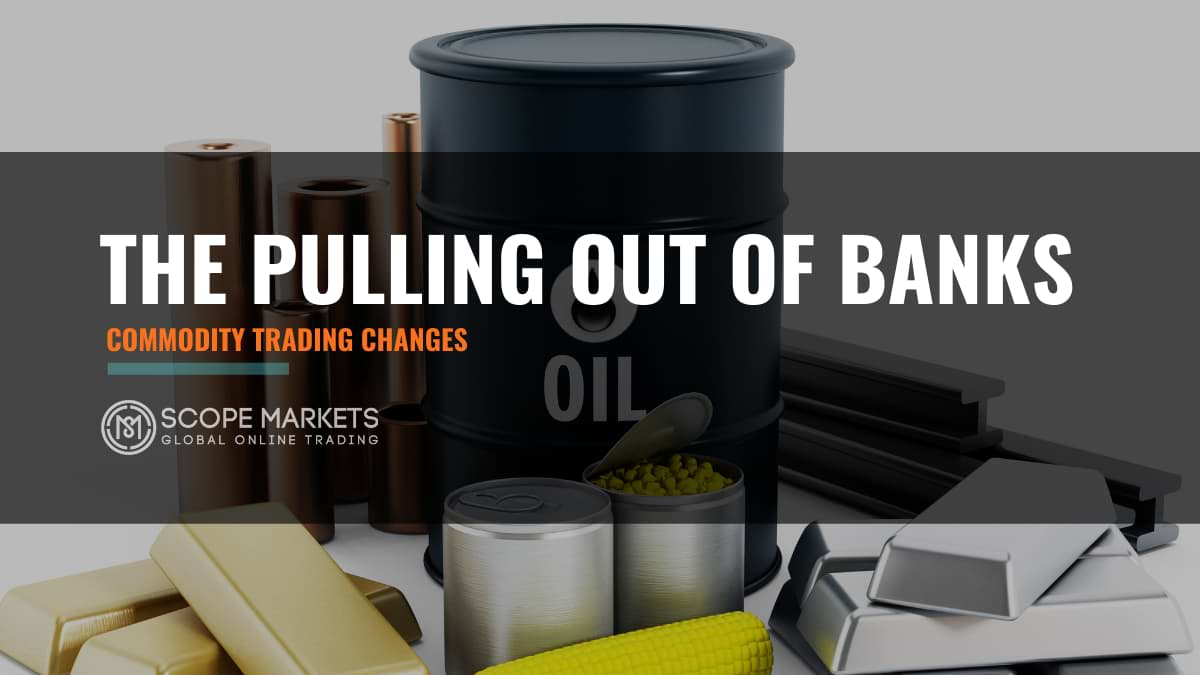Big Banks Pulling Out From Commodity Trading

Table of Content
According to banking and trading sources, there is a crisis today in the world of commodity trading. This type of situation has not been seen in global trade for at least two decades. This is mostly a result of the coronavirus crisis, which has led to defaults by some intermediaries in the world of commodity trading. The fact that some frauds have been exposed in the business has only worsened the crisis.
Big banks are pulling out of the business to control the damage. The worst sufferers are the small and medium-sized firms. For readers who are having difficulty in understanding the present crisis, this is an attempt to explain it as clearly as possible. After reading this, you should be much better informed. We’ll cover the topic under the following heads:
- What is Commodity Trading?
- How has the Coronavirus Pandemic Affected Commodity Trading?
- Why are the Big Banks Pulling Out?
- What Will Happen to Commodity Trading Now?
Click to Tweet
The current pandemic has led the commodities trading market to a situation not seen in international trade for at least two decades. The banks are leaving the commodities trading market for self-preservation and that’s difficult for small and medium-sized businesses.
What is Commodity Trading?
To know and understand what is commodity trading, it is important for us to know a few other things first. We need to know:
- What is a Commodity>
- What is the Commodity Market?
- What is a Commodity Trader?
- What Does a Commodity Trader Do?
What is a Commodity?
A commodity is a primary product, rather than a manufactured product. This means agricultural products like wheat, cotton, vegetables and sugar. Hard commodities are the primary products that are mined like gold, diamonds or oil, which is the raw material from which gasoline is made.
What is the Commodity Market?
The commodity market is the market of basic or primary products, whether these commodities are agricultural produce or mined raw materials.
What is a Commodity Trader?
A commodity trader could be an individual or a business. Commodity traders are primarily investors. They may not necessarily have need of the commodities in which they trade. The commodity trader could as easily be a financier as a cotton trader.
What Does a Commodity Trader Do?
For the commodity trader, commodity trading can be primarily an investment strategy, a means to make money. Or the trader could be in the business to procure raw materials for their industry at the best price.
However, the investment trader can come to grief if the commodity prices go in the wrong direction, as can happen in the case of natural disasters, including pandemics. Commodity traders need to have quick reflexes to take advantage of the changes and trends in the commodity trading market.
Click to Tweet
Commodity traders need to have quick reflexes to take advantage of the changes and trends in the commodity trading market. Today they are facing a major crisis in the market. This is the effect of the global pandemic.
The coronavirus pandemic has affected trading of commodities like nothing else. It has affected both demand and supply. Business and economic growth have slowed down and this has naturally affected the market. The influence of the pandemic is twofold. There is a direct effect and an indirect effect.
The suspension of a lot of human activity has led to upsets in the chain of supply. Indirect effects of retarded economic growth lead to a long-drawn-out recession, from which it will take a long time to recover
The Response Strategy of the Banks
According to banking sources, not only has the pandemic slowed down economic growth and disturbed the supply chain, but a number of frauds have been discovered in the trading market. This has led to substantial losses for the banks. The commodity traders have relied on the banks to aid their business by extending credit to them as they trade commodities.
Whether the commodities trader is in the business to make a profit for themselves or else procure raw materials for their business at the best possible price, this has been the role of the banks. These traders are the intermediaries between the producers of the raw materials and the end-users. ABN Amro, the Dutch International bank, has recently left the commodities trading business after huge losses involving an Asian oil trader.
The Advance of Economic Slowdown
There’s no doubt that lockdown lead to a slowdown in business in so many areas. Under lockdown, no-one could go anywhere. Kids couldn’t go to school and their parents couldn’t go to offices.
With the result, there was much less traffic on the roads and the demand for fuel declined. Between disturbance in the chain of supply and reduced demand, it’s not surprising that there has been a lot of loss in business.
Difficulties for Commodity Markets Under Lockdown
Those who trade in commodities have been hampered by the lockdown. Apart from the difficulty in getting around, the decline in demand for formerly essential commodities has hit traders very hard. The slowing down in business doesn’t do them any favours either.
What’s even worse is, that as the bigger banks disappear from the scene, as bankers hedge their bets, there will be higher interest rates for commodity financing. Naturally, only the bigger investors will survive. Small and medium-sized business houses and individual investors will not be able to survive, should the situation continue.
Click to Tweet
The coronavirus pandemic has affected trading of commodities like nothing else. It has affected both demand and supply. The effects will be felt for a long time to come.
Why are the Big Banks Pulling Out of the Commodity Market?

As mentioned, the banks are getting out of the business as a damage control measure. The huge losses sustained by a bank like ABN Ambro as a result of the failure of one of Asia’s biggest oil traders couldn’t be the only such incident. Other banks look set to follow. With fewer banks on the scene, there will surely be higher rates of interest with which to contend.
Failure of Revolving Credit Facilities(RCFs)
Traders had been putting on the pressure for something called a revolving credit facility(RCFs). The nature of these loans for the borrower is that they are cheap and they involve a threshold up to which the client may borrow. When a client defaults on a loan, it leads to huge losses for the bank.
This is the type of situation that caused ABN Amro to leave the business. With rising finance costs, there’s no doubt that smaller and medium-sized businesses are now in a vulnerable position. Whether they can weather the storm and stay in business during this season of slow growth and loss remains to be seen.
The Difficulty for Financier
The commodities market is a fast place. Traders in commodities need to act fast to make the most of what’s trending. For that, they need financiers who can lend them the cash they need to take advantage of the trends they notice in the market. With the absence of ready finance, the traders would find it very difficult to act quickly now, as accessible finance goes right out of reach.
The financier can no longer afford to be so trusting and instead needs to exercise the utmost caution. The financier as well as the trader will miss out, but what can be done about this? Only a turnaround in economic growth could help. That seems to be a long way off.
Strong Dependence on Trade Finance
Sources inform us that 80% of international trade depends on loans of some sort. The disappearance of major banks from trade finance will be keenly felt. It remains to be seen how things will work out for the traders. Will the current slowdown last for a long time or will it recover quickly?
Click to Tweet
With rising costs, there’s no doubt that smaller and medium sized businesses are now in a vulnerable position.
What Will Happen to Commodity Markets Now?
At the time of writing, the world is quietly trying to ease out of lockdown restriction. Yet the pandemic is still going on. Many countries have gone all out the ‘flatten the curve’, yet reports of second and third waves of the pandemic continue to roll in.
Children around the world are starting to go back to school. Yet it remains to be seen if this situation can continue. If the virus continues to spread, people may be forced to return to the lockdown situation. It appears that the pandemic is going to last a lot longer than anyone had hoped or thought.
How Long Under Lockdown?
It’s obvious that the pandemic won’t abate any time soon, especially if the reports of second and third waves are anything to go by. The current economic situation could have turned around had things settled down in a few short months. But it’s looking increasingly doubtful that things will settle down before the end of the year.
In August 2020, schools in countries like India look set to stay closed until December 2020. So it seems like things won’t normalise any time soon. Even in countries where lockdown restrictions have eased, there is always a danger that restrictions might be imposed again.
How Long Can Economic Slowdown Continue?
The economic situation can’t really start to improve until things begin to normalise again. The demand for some commodities may decline and the demand for others may continue. Whether the traders of commodities can continue to trade while conditions continue to change and evolve remains to be seen.
On the other hand, it could stabilise, for the time being, not getting worse, yet slowly recovering over time. It’s probably best to keep a positive attitude, while being aware that the situation can deteriorate, depending on the circumstances. Meanwhile, as the pandemic curve continues to flatten, it’s probably better to try to be as optimistic as possible about the future.
Click to Tweet
As the pandemic curve continues to flatten, it’s probably better to try to be as optimistic as possible about the future.
Reference:
Reuters – Commodity traders face rising finance costs as big banks pull out
Disclaimer: This material is a marketing communication and shall not in any case be construed as an investment advice, investment recommendation or presentation of an investment strategy. The marketing communication is prepared without taking into consideration the individual investors personal circumstances, investment experience or current financial situation. Any information contained therein in regardsto past performance or future forecasts does not constitute a reliable indicator of future performance, as circumstances may change over time. Scope Markets shall not accept any responsibility for any losses of investors due to the use and the content of the abovementioned information. Please note that forex trading and trading in other leveraged products involves a significant level of risk and is not suitable for all investors.







